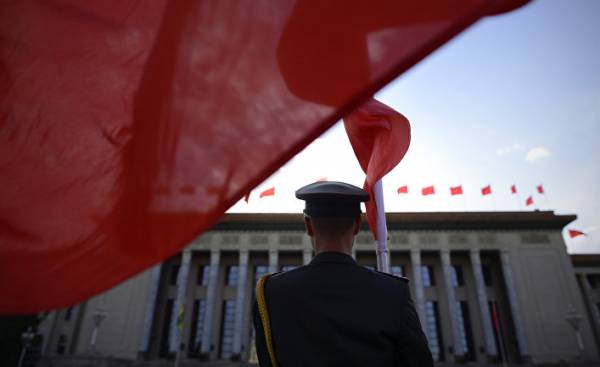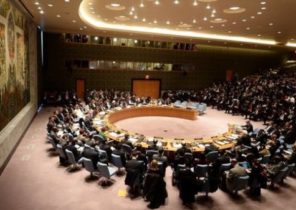
A senior CIA analyst has provided a rare opportunity to meet with the American intelligence analysis of China’s policy. Michael Collins (Michael Collins), Deputy assistant Director of the East Asia center, CIA (East Asia mission center), believes that today more attention should be paid to China, and the current apprehension regarding Russia distract America from the threat posed by China.
“Today a lot of talk about Russia as a rival, as a country, which considers the liberal international order as something that is optional to join. This country is actively trying to undermine the influence of the United States in various places around the world, and it has the potential to do it,” said Collins, speaking at a security forum in the city of aspen, Colorado.
“In my opinion, for China, all three of these provisions also relate, and he is gaining more strength in order to do much more in these areas”.
According to Collins, Russia was creating problems for the United States in the international arena. In addition, Moscow is quite satisfied with the tension in us-China relations.
“Russia is very helps that China is a problem for the United States, he said. And even when we just think of the Russian problem for the United States, I believe that today it is very convenient and useful for the Russians know that the Chinese have also conflicting relations with the United States, and that they in some way can support each other.”
From the point of view of the CIA, China is undermining the U.S.-led world order, ensure peace and stability in Asia over the last 40 years. Beijing is trying to usurp in the hands of American power and influence in the region.
The rivalry between China and the United States is not limited to Asia, and it is noticeable all over the world, — said Collins, pointing to newly open a large military base in the strategically important horn of Africa, in Djibouti. The Chinese base is located near the American military base in the same region.
One of the problems is anti-democratic system of China.
“They have other ideas about government and what it means, and, in addition, they increasingly resort to coercion to pushy tactics to achieve their goals — we do not approve of this sort of thing, and other countries in that region don’t approve of,’ said Collins. — To understand the situation with North Korea, trading in the South China sea and China’s approach to these issues, we need to remember that.”
Unlike the scientist of Harvard University, Graham Allison (Alison Graham), Collins believes that the war between the United States and China is predefined. China, he said, not trying to interfere with the United States or with other Nations, and seeks to maintain stable ties with Washington.
Another problem for Beijing is, according to Collins, “domestic political vulnerability and stability.”
“Therefore, the Chinese must be reliably to control it, and for this they need stability, as well as close and stable relations with the United States,” he said.
As for the question of the South China sea, then, by definition, the Collins, China from “hope in the field of territorial claims” is moving to a policy that is increasingly focused on putting pressure. Hope China include the control of sea lanes for several reasons — military, economic, political, and also from the point of view of rendering of common effects.
“It’s one thing when such things remain in the field of dreams and another when they think that, in fact, possible to achieve, noted Collins. And we are increasingly convinced that, in the opinion of the Chinese, they are moving forward in the South China sea, and the same can be said about other areas — it becomes for them all the more achievable”.
The growing determination of China causes concern at CIA, and Collins believes it fueled in recent years by the inaction against the Chinese hegemony.
“Unfortunately, the Chinese, in my opinion, in the last few years, we realized that they are able to use a coercive approach in its promotion in the South China sea, as well as in other places — I can apply the same model to other issues — whether economic or political sphere surrounding this region — and they managed to do it without getting any strong reaction”, — he said. The recent decision of the Permanent court of arbitration court of the UN against China’s claims to 90% of the South China sea was met with disdain by Beijing.
“In our opinion, they made the conclusion that they can ignore the international law, and for them it will be nothing,” — said Collins.
This analyst warned that the growing arrogance of China does not Bode well for the United States and other countries in the region. “The Chinese continue to think that they get away with it, and use more and more coercive, more assertive approach in their actions, he said. — We are concerned that they continue to expand their capabilities.”
With regard to the situation in the country, Collins also warns that Chinese leaders are promoting a narrative about the need to establish control over disputed waters as “what the Chinese have to make.” In the past, Chinese Communist leaders have restricted their concept of essential national interests of the protection of the Communist party and regain control over Taiwan. Today, they have expanded the definition of core interests to include the South China sea. “By doing this, they create certain expectations in the country, and I worry that they’re going to justify them and would make their way on this difficult path,” he said.
Answering the question, not whether the United States and China into the game of “chicken” — both sides are trying to figure out where are the red lines of each other, Collins said that this game is largely conducted on the Chinese side.
“The Chinese are learning what I call the didactic of foreign policy, we are talking about a didactic approach to what they can get away with it,’ said Collins. — I hope that the Chinese will begin to realize that their behavior not only from our point of view, but also from the perspective of East Asia — in fact it creates more negative consequences, a purely negative result for their interests in security and stability in General than something positive that they can get.
According to Collins, the new administration of President trump is in a critical period in terms of the formation of China’s perception of the United States.
Beijing expects a certain degree of tension in its relations with the United States, but he is not sure at what point this tension can escalate to confrontation.
“I think the Chinese are trying to understand the new administration, they are trying to figure out where are those areas in which this administration probably wants to avoid more tension, and in which, perhaps, it do not intend” — he stressed.
There is one area in which the administration trump is putting strong pressure on China is the situation with North Korea. According to the CIA, Beijing provides 90% of trade with this rogue state, and therefore he could do much more. According to Collins, Beijing supported the proposal for the denuclearization of North Korea, but it took much more extended in time schedule for the implementation of this idea that is not like the United States.
As for the Chinese leadership, according to Collins, the Supreme leader XI Jinping will strengthen its position after the upcoming Communist party Congress. “The impression that he is going to get more power after this party Congress,” he said. China wants North Korea was a strategic buffer zone, which will be put in a difficult position the United States and its allies. The CIA believes that si will try to extend his term beyond the limit of two five-year term, and it is very similar to what was done by the late Deng Xiaoping, who ruled behind the scenes in the 1980-ies. “Regardless of his position, he probably will stay pretty influential person, taking into account their personal loyalty,” he said.
Collins also questioned one of the fundamental precepts of American foreign policy, the essence of which is that trade and contacts with China will generate democratic political reforms.
“In my opinion, today there is optimism about the fact that the contacts with China will lead to political reforms, those reforms, which we might expect to see from the Chinese at the moment as a result of extension contacts. But nothing we have not seen.”







